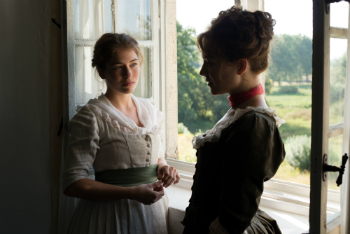Review: BELOVED SISTERS, Characters Who Never Become Real People

More than a film about a romantic ménage a trois, Beloved Sisters is just as well the story of two sisters, two women who swear loyalty to each other and keep their oath in spite of the biggest challenge their relationship can face: the love and desire for one and the same man, namely, the famous German poet Friedrich Schiller.
At first Dominik Graf's film disguises itself as a history piece with elaborate set designs and costumes, carefully mentioning dates and geographical details to create the illusion of truthfulness. The voiceover even uses present tense, claiming to be a history teacher rather than a story teller. But it's all a farce.
Even though there are hints that Friedrich Schiller had relationships with Charlotte von Lengefeld as well as her sister Caroline von Beulwitz, most of the story stems from Dominik Graf's imagination. In his fictitious version of the occurrences in the 18th century, Charlotte (Henriette Confurius) meets Schiller (Florian Stetter) when she is in Weimar to become a member of the court. But instead of marrying some nobleman, she falls in love with the broke poet who is not the suitor her family was hoping for. Only her sister Caroline (Hannah Herzsprung) immediately shares the affection for the sensitive and delicate artist.
Maybe the real Schiller did have a non-platonic relationship with Caroline von Beulwitz, but not necessarily the kind of ménage a trois that Dominik Graf presents to his audience. And while some elements constantly create the illusion of historicity, others destroy it right away. Flying titles in modern fonts naming dates and locations mock the handwritten letters that pretend to be originally from the 18th century. Characters speaking directly to the audience break the fourth wall and therewith the cinematic illusion. Stiff acting destroys the authenticity that set design and period costumes so carefully created.
Schiller's deliberate choice of words sounds as if he was constantly citing his own written works. And even in bed people are sober enough to address each other in elaborate sentences rather than passionate groans. This is an intellectual world where emotions are spoken or written, but not necessarily performed. It is only under a wild waterfall that the protagonists break out of their emotional corset, scream and cry, while the rushing water masses cushion their sounds and words.
As soon as Dominik Graf sets up historical or emotional authenticity, he destroys it right away. He doesn't want his audience to believe in the truthfulness of these events, but reminds it over and over again that what it sees on screen is nothing more than a story. At the core of this story lies the utopian idea of overcoming bourgeois traditions, in this case marriage, in order to find a true life and love, true love between sisters who repeatedly sacrifice their own happiness for the other one, true love that the two women feel for the same man without getting lost in jealousy and possessiveness.
And of course, as it is the case with every utopia, it shatters when confronted with reality. In the same way that Graf's epic elements constantly challenge the historical setting, the love triangle is put to the test by its contemporary society. And in the same way that Graf's style is inconsistent with its story, the three lovers are inconstant with their era.
"Literature can very well deal with inconsistencies" (my translation) Graf has Schiller say at one point in the movie and it is as if the writer-director herewith comments on his own work. Beloved Sisters is full of inconsistencies just as life itself. Does this make it a good movie? I must say, that it does give the concept a special truthfulness, not in a historical but rather a metaphysical way.
 But as the characters in the film deal with their lives very intellectually, the film demands the same of its audience: to understand rather than to feel it. This approach makes it difficult to establish a relationship with the on-screen characters, to understand their feelings and be empathetic with their struggle. They never become real people but stay roles in a play.
But as the characters in the film deal with their lives very intellectually, the film demands the same of its audience: to understand rather than to feel it. This approach makes it difficult to establish a relationship with the on-screen characters, to understand their feelings and be empathetic with their struggle. They never become real people but stay roles in a play.
The cinema version that is 30 minutes shorter than the version presented at Berlinale in February 2014 faces another problem, though I can only speculate if it derives from the cut, for I didn't see the long version. In the course of the film, the character's decisions get more and more unclear, as if explanatory moments were missing, and the resulting cracks in the triad are hard to understand.
When emotions finally break out - this time far away from the waterfall - the scene feels almost ridiculously staged and artificial, another break with the filmic illusion that is topped shortly after with a shot of contemporary Weimar, including 21st century passersby. Once more, Dominik Graf reminds us that this is just a story.
But is it really? Beloved Sisters could tell us so much about female bonding, about love outside of the monogamous-heterosexual box, about challenging established socio-cultural norms on the deepest level. But it fails to do so. We never get close enough to make this struggle our own, to understand its necessity or its meaning. For many it will just be about three people trying and failing to form a love triangle.
And for me personally it's also about a sickly artist who is actually the weakest of all central personalities and still gets to be the martyr and the figurehead on the movie poster in the end.
Review originally published in slightly different form during the film's theatrical release in Germany. The film opens in select theaters in the U.S. on Friday, January 9. Visit the official U.S. site for more information.
Beloved Sisters
Director(s)
- Dominik Graf
Writer(s)
- Dominik Graf (screenplay)
Cast
- Hannah Herzsprung
- Florian Stetter
- Henriette Confurius
- Claudia Messner







